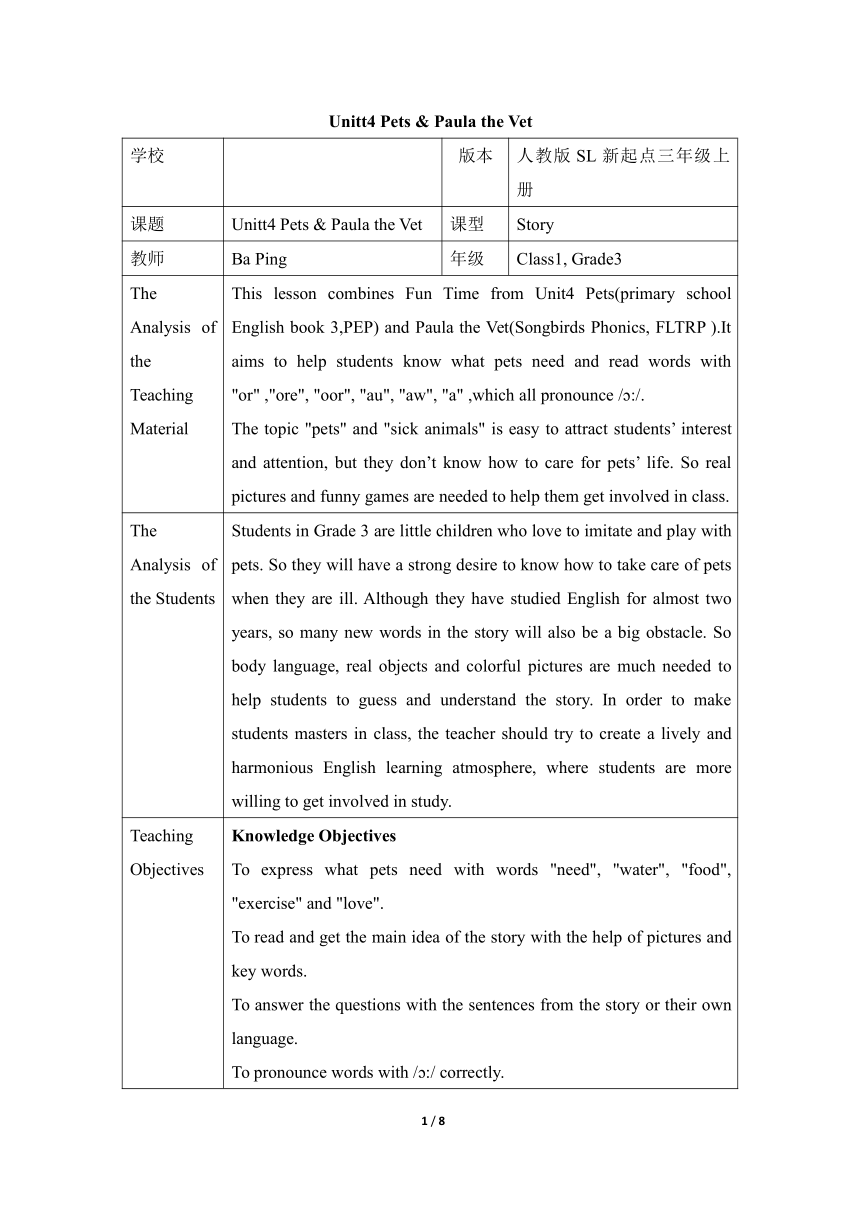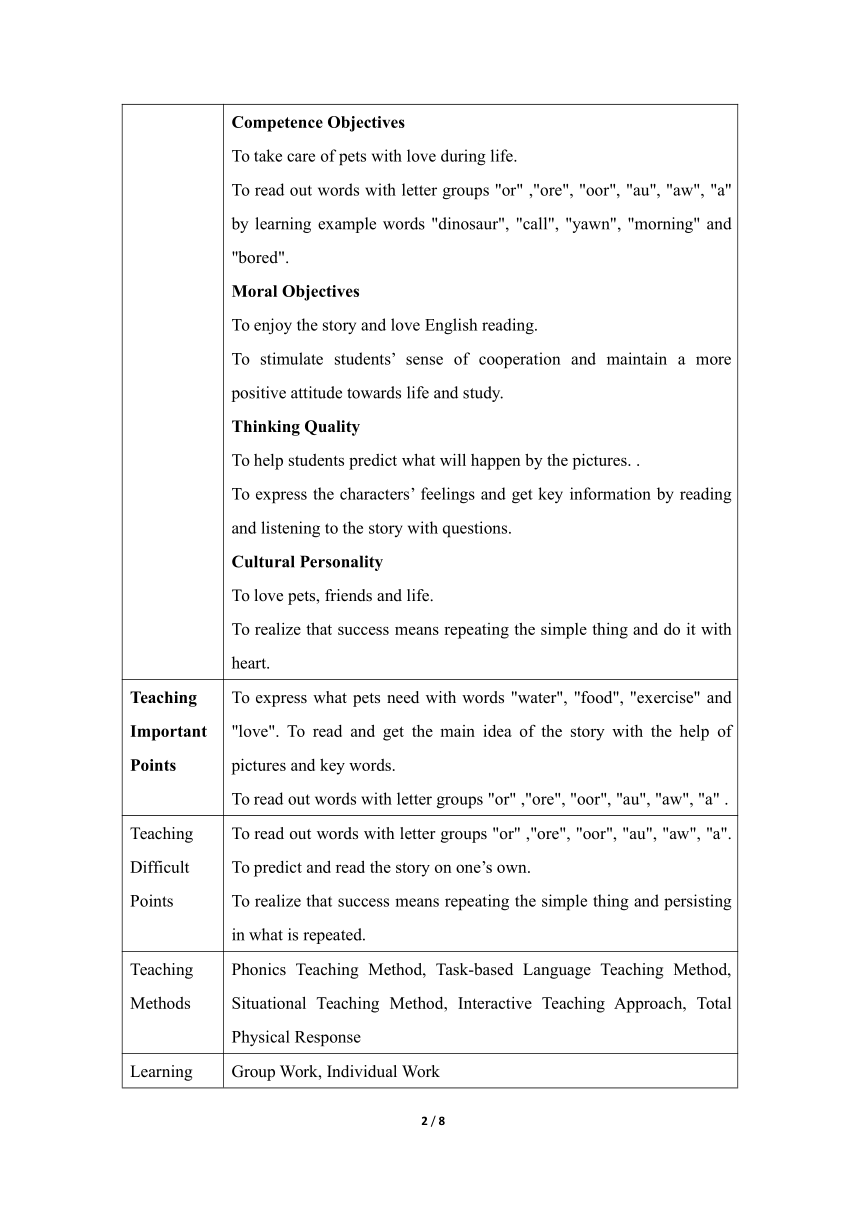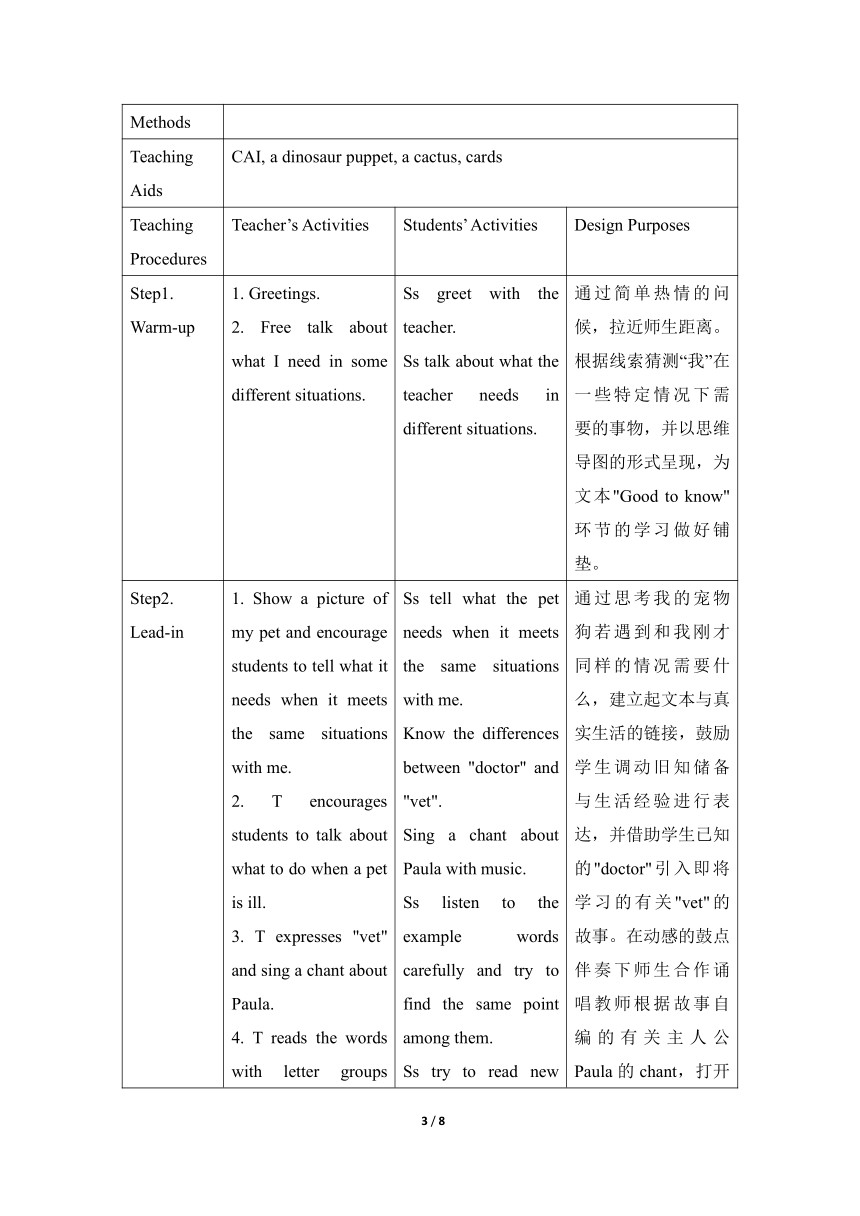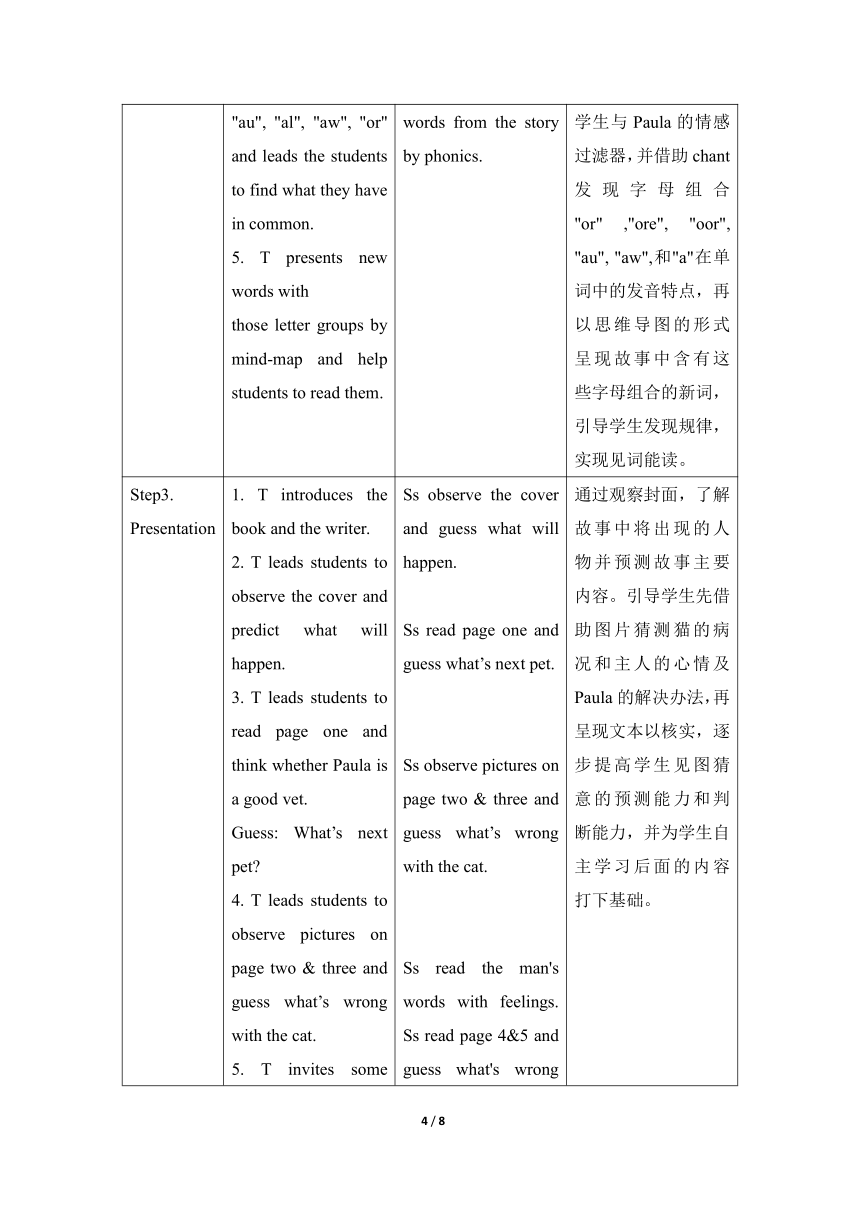Unit 4 Pets story 表格式教案 (含反思)
文档属性
| 名称 | Unit 4 Pets story 表格式教案 (含反思) |

|
|
| 格式 | zip | ||
| 文件大小 | 46.5KB | ||
| 资源类型 | 教案 | ||
| 版本资源 | 人教(新起点) | ||
| 科目 | 英语 | ||
| 更新时间 | 2019-09-06 18:48:21 | ||
图片预览




文档简介
Unitt4 Pets & Paula the Vet
学校 版本 人教版SL新起点三年级上册
课题 Unitt4 Pets & Paula the Vet 课型 Story
教师 Ba Ping 年级 Class1, Grade3
The Analysis of the Teaching Material This lesson combines Fun Time from Unit4 Pets(primary school English book 3,PEP) and Paula the Vet(Songbirds Phonics, FLTRP ).It aims to help students know what pets need and read words with "or" ,"ore", "oor", "au", "aw", "a" ,which all pronounce /?:/. The topic "pets" and "sick animals" is easy to attract students’ interest and attention, but they don’t know how to care for pets’ life. So real pictures and funny games are needed to help them get involved in class.
The Analysis of the Students Students in Grade 3 are little children who love to imitate and play with pets. So they will have a strong desire to know how to take care of pets when they are ill. Although they have studied English for almost two years, so many new words in the story will also be a big obstacle. So body language, real objects and colorful pictures are much needed to help students to guess and understand the story. In order to make students masters in class, the teacher should try to create a lively and harmonious English learning atmosphere, where students are more willing to get involved in study.
Teaching Objectives Knowledge Objectives To express what pets need with words "need", "water", "food", "exercise" and "love". To read and get the main idea of the story with the help of pictures and key words. To answer the questions with the sentences from the story or their own language. To pronounce words with /?:/ correctly. Competence Objectives To take care of pets with love during life. To read out words with letter groups "or" ,"ore", "oor", "au", "aw", "a" by learning example words "dinosaur", "call", "yawn", "morning" and "bored". Moral Objectives To enjoy the story and love English reading. To stimulate students’ sense of cooperation and maintain a more positive attitude towards life and study. Thinking Quality To help students predict what will happen by the pictures. . To express the characters’ feelings and get key information by reading and listening to the story with questions. Cultural Personality To love pets, friends and life. To realize that success means repeating the simple thing and do it with heart.
Teaching Important Points To express what pets need with words "water", "food", "exercise" and "love". To read and get the main idea of the story with the help of pictures and key words. To read out words with letter groups "or" ,"ore", "oor", "au", "aw", "a" .
Teaching Difficult Points To read out words with letter groups "or" ,"ore", "oor", "au", "aw", "a". To predict and read the story on one’s own. To realize that success means repeating the simple thing and persisting in what is repeated.
Teaching Methods Phonics Teaching Method, Task-based Language Teaching Method, Situational Teaching Method, Interactive Teaching Approach, Total Physical Response
Learning Methods Group Work, Individual Work
Teaching Aids CAI, a dinosaur puppet, a cactus, cards
Teaching Procedures Teacher’s Activities Students’ Activities Design Purposes
Step1. Warm-up 1. Greetings. 2. Free talk about what I need in some different situations. Ss greet with the teacher. Ss talk about what the teacher needs in different situations. 通过简单热情的问候,拉近师生距离。根据线索猜测“我”在一些特定情况下需要的事物,并以思维导图的形式呈现,为文本"Good to know"环节的学习做好铺垫。
Step2. Lead-in 1. Show a picture of my pet and encourage students to tell what it needs when it meets the same situations with me. 2. T encourages students to talk about what to do when a pet is ill. 3. T expresses "vet" and sing a chant about Paula. 4. T reads the words with letter groups "au", "al", "aw", "or" and leads the students to find what they have in common. 5. T presents new words with those letter groups by mind-map and help students to read them. Ss tell what the pet needs when it meets the same situations with me. Know the differences between "doctor" and "vet". Sing a chant about Paula with music. Ss listen to the example words carefully and try to find the same point among them. Ss try to read new words from the story by phonics. 通过思考我的宠物狗若遇到和我刚才同样的情况需要什么,建立起文本与真实生活的链接,鼓励学生调动旧知储备与生活经验进行表达,并借助学生已知的"doctor"引入即将学习的有关"vet"的故事。在动感的鼓点伴奏下师生合作诵唱教师根据故事自编的有关主人公Paula的chant,打开学生与Paula的情感过滤器,并借助chant发现字母组合"or" ,"ore", "oor", "au", "aw",和"a"在单词中的发音特点,再以思维导图的形式呈现故事中含有这些字母组合的新词,引导学生发现规律,实现见词能读。
Step3. Presentation 1. T introduces the book and the writer. 2. T leads students to observe the cover and predict what will happen. 3. T leads students to read page one and think whether Paula is a good vet. Guess: What’s next pet? 4. T leads students to observe pictures on page two & three and guess what’s wrong with the cat. 5. T invites some students to read the man's words with feelings. 6. T leads students to read page 4&5 and guess what's wrong with the cat's paw. Question: How does Paula help it? 7. T presents a medical note about the cat and help students to guess the man’s feeling now. Ss observe the cover and guess what will happen. Ss read page one and guess what’s next pet. Ss observe pictures on page two & three and guess what’s wrong with the cat. Ss read the man's words with feelings. Ss read page 4&5 and guess what's wrong with the cat's paw. Then guess how Paula helps the cat. Ss know about medical note and guess the man’s feeling now. 通过观察封面,了解故事中将出现的人物并预测故事主要内容。引导学生先借助图片猜测猫的病况和主人的心情及Paula的解决办法,再呈现文本以核实,逐步提高学生见图猜意的预测能力和判断能力,并为学生自主学习后面的内容打下基础。
Step4. Practice 1. T shows pictures of the following three animals and helps students guess their problems. 2. T encourages students to read through the picture book from page 6 to page 16 and find the solutions. 3. T presents some reading tips to help the students. 4. Give ten seconds to share the answer with partner and then check. 5. T plays the record and presents the pictures from page 17 to page 19. Questions: Is Paula tired? Is Paula bored? Does Paula love her job? Discuss: Will Paula become number one in her field? 6. T helps students realize that success is to repeat doing the simple thing and do it with your heart. 7. Read page 20 to page 24 together with feelings. Ss observe the pictures and guess the pets’ problems. Ss read through the picture book from page 6 to page 16 and find the solutions to help the pets. Ss know about reading tips and use them when reading. Ss check the answers with partners. Ss listen and observe pictures from page 17 to page 19. Then answer questions about Paula and discuss whether Paula will become the best vet. Ss try to get the core of the story. 学生带着了解第一个动物病况时所习得的方法,自主学习故事,在解疑过程中逐渐理解文本,锻炼从故事中提取信息的能力,并逐步渗透阅读方法,培养学生的阅读技巧和提高自主学习的能力,让学生喜欢阅读,学会阅读。看图听故事的环节让学生在课堂上紧张的神经得到些许放松,听后问题的设置加深了学生对故事的理解并引导学生逐步感知故事背后隐含的含义,使语言学习与德育相结合,让学生对故事的情感体验得以升华。师生有感情的齐声朗读故事最后一节,在读的过程中注意对学生诸如连读、重读等朗读技巧的指导,既锻炼了学生的口语,又加深了对文本的理解。
Step5. Extension T leads students to observe the last picture and discuss with imagination. Ss observe the last picture and discuss: If you are Paula, what will you do? 给学生想象空间,发散学生思维,给学生提供真实运用所学语言表达自己观点的机会,引起学生阅读和思考的兴趣。
Step 6. Summary and Assessment 1. T invites students to summarize what they’ve enjoyed in this lesson. 2. T encourages Ss to circle the stars they get. Ss try to summarize what they’ve got in this lesson. Ss circle the stars according to the tasks that they’ve finished. To raise Ss’ ability of concluding. To realize how they really develop in this lesson.
Step7. Homework 1. Design a poster about pet caring. 2. Share Paula the Vet with parents and try to make a medical note for the dinosaur. 3. Enjoy Julia's another interesting picture book The Gruffalo. 根据学生的学习能力和个性差异分层布置课后作业,避免“一刀切”,既满足了学有余力的学生深入探究的需求,又为基础薄弱的学生提供了进步的阶梯。
Reflection 本课将人教SL新起点三年级上册第四单元的Fun Time部分与外研社丽声拼读故事绘本Paula the Vet相结合,在文本导入环节我抓住小学生好奇心重的心理,以真实的图片呈现自己的生活所需自然的过渡到我的宠物所需,吸引并鼓励学生都能积极踊跃的参与到教学活动中来。《小学英语教学与教材编写纲要》指出,兴趣是学好语言的关键,激发学生学习英语的兴趣是小学阶段英语教学的一项重要任务。因此,我将绘本故事《兽医葆拉》与该单元话题“宠物”相结合,不仅使英语课堂更具有趣味性,更有助增长学生智慧,丰富生活经验。在绘本教学环节,我通过整合绘本中的新词自编了一个关于主人公的chant, 师生在动感的鼓点伴奏下打开与故事主人公Paula的情感过滤器,并借助chant发现字母组合"or" ,"ore", "oor", "au", "aw",和"a"在单词中的发音特点,引导学生发现规律,实现见词能读,效果良好。故事教学中,通过审图画、听故事、读故事和演故事等活动,发展学生的预测和判断能力,促进其多元智能的发展。然而,由于课堂时间有限且低年级学生词汇量不足使得活动设计偏向简单,从而导致学生对于故事的理解和内化仍有待加深。在日后课本与绘本相结合的教学中,我会设计更加丰富的故事理解活动,组织更多的小组活动形式,做到提问力求启发思维。
8 / 8
学校 版本 人教版SL新起点三年级上册
课题 Unitt4 Pets & Paula the Vet 课型 Story
教师 Ba Ping 年级 Class1, Grade3
The Analysis of the Teaching Material This lesson combines Fun Time from Unit4 Pets(primary school English book 3,PEP) and Paula the Vet(Songbirds Phonics, FLTRP ).It aims to help students know what pets need and read words with "or" ,"ore", "oor", "au", "aw", "a" ,which all pronounce /?:/. The topic "pets" and "sick animals" is easy to attract students’ interest and attention, but they don’t know how to care for pets’ life. So real pictures and funny games are needed to help them get involved in class.
The Analysis of the Students Students in Grade 3 are little children who love to imitate and play with pets. So they will have a strong desire to know how to take care of pets when they are ill. Although they have studied English for almost two years, so many new words in the story will also be a big obstacle. So body language, real objects and colorful pictures are much needed to help students to guess and understand the story. In order to make students masters in class, the teacher should try to create a lively and harmonious English learning atmosphere, where students are more willing to get involved in study.
Teaching Objectives Knowledge Objectives To express what pets need with words "need", "water", "food", "exercise" and "love". To read and get the main idea of the story with the help of pictures and key words. To answer the questions with the sentences from the story or their own language. To pronounce words with /?:/ correctly. Competence Objectives To take care of pets with love during life. To read out words with letter groups "or" ,"ore", "oor", "au", "aw", "a" by learning example words "dinosaur", "call", "yawn", "morning" and "bored". Moral Objectives To enjoy the story and love English reading. To stimulate students’ sense of cooperation and maintain a more positive attitude towards life and study. Thinking Quality To help students predict what will happen by the pictures. . To express the characters’ feelings and get key information by reading and listening to the story with questions. Cultural Personality To love pets, friends and life. To realize that success means repeating the simple thing and do it with heart.
Teaching Important Points To express what pets need with words "water", "food", "exercise" and "love". To read and get the main idea of the story with the help of pictures and key words. To read out words with letter groups "or" ,"ore", "oor", "au", "aw", "a" .
Teaching Difficult Points To read out words with letter groups "or" ,"ore", "oor", "au", "aw", "a". To predict and read the story on one’s own. To realize that success means repeating the simple thing and persisting in what is repeated.
Teaching Methods Phonics Teaching Method, Task-based Language Teaching Method, Situational Teaching Method, Interactive Teaching Approach, Total Physical Response
Learning Methods Group Work, Individual Work
Teaching Aids CAI, a dinosaur puppet, a cactus, cards
Teaching Procedures Teacher’s Activities Students’ Activities Design Purposes
Step1. Warm-up 1. Greetings. 2. Free talk about what I need in some different situations. Ss greet with the teacher. Ss talk about what the teacher needs in different situations. 通过简单热情的问候,拉近师生距离。根据线索猜测“我”在一些特定情况下需要的事物,并以思维导图的形式呈现,为文本"Good to know"环节的学习做好铺垫。
Step2. Lead-in 1. Show a picture of my pet and encourage students to tell what it needs when it meets the same situations with me. 2. T encourages students to talk about what to do when a pet is ill. 3. T expresses "vet" and sing a chant about Paula. 4. T reads the words with letter groups "au", "al", "aw", "or" and leads the students to find what they have in common. 5. T presents new words with those letter groups by mind-map and help students to read them. Ss tell what the pet needs when it meets the same situations with me. Know the differences between "doctor" and "vet". Sing a chant about Paula with music. Ss listen to the example words carefully and try to find the same point among them. Ss try to read new words from the story by phonics. 通过思考我的宠物狗若遇到和我刚才同样的情况需要什么,建立起文本与真实生活的链接,鼓励学生调动旧知储备与生活经验进行表达,并借助学生已知的"doctor"引入即将学习的有关"vet"的故事。在动感的鼓点伴奏下师生合作诵唱教师根据故事自编的有关主人公Paula的chant,打开学生与Paula的情感过滤器,并借助chant发现字母组合"or" ,"ore", "oor", "au", "aw",和"a"在单词中的发音特点,再以思维导图的形式呈现故事中含有这些字母组合的新词,引导学生发现规律,实现见词能读。
Step3. Presentation 1. T introduces the book and the writer. 2. T leads students to observe the cover and predict what will happen. 3. T leads students to read page one and think whether Paula is a good vet. Guess: What’s next pet? 4. T leads students to observe pictures on page two & three and guess what’s wrong with the cat. 5. T invites some students to read the man's words with feelings. 6. T leads students to read page 4&5 and guess what's wrong with the cat's paw. Question: How does Paula help it? 7. T presents a medical note about the cat and help students to guess the man’s feeling now. Ss observe the cover and guess what will happen. Ss read page one and guess what’s next pet. Ss observe pictures on page two & three and guess what’s wrong with the cat. Ss read the man's words with feelings. Ss read page 4&5 and guess what's wrong with the cat's paw. Then guess how Paula helps the cat. Ss know about medical note and guess the man’s feeling now. 通过观察封面,了解故事中将出现的人物并预测故事主要内容。引导学生先借助图片猜测猫的病况和主人的心情及Paula的解决办法,再呈现文本以核实,逐步提高学生见图猜意的预测能力和判断能力,并为学生自主学习后面的内容打下基础。
Step4. Practice 1. T shows pictures of the following three animals and helps students guess their problems. 2. T encourages students to read through the picture book from page 6 to page 16 and find the solutions. 3. T presents some reading tips to help the students. 4. Give ten seconds to share the answer with partner and then check. 5. T plays the record and presents the pictures from page 17 to page 19. Questions: Is Paula tired? Is Paula bored? Does Paula love her job? Discuss: Will Paula become number one in her field? 6. T helps students realize that success is to repeat doing the simple thing and do it with your heart. 7. Read page 20 to page 24 together with feelings. Ss observe the pictures and guess the pets’ problems. Ss read through the picture book from page 6 to page 16 and find the solutions to help the pets. Ss know about reading tips and use them when reading. Ss check the answers with partners. Ss listen and observe pictures from page 17 to page 19. Then answer questions about Paula and discuss whether Paula will become the best vet. Ss try to get the core of the story. 学生带着了解第一个动物病况时所习得的方法,自主学习故事,在解疑过程中逐渐理解文本,锻炼从故事中提取信息的能力,并逐步渗透阅读方法,培养学生的阅读技巧和提高自主学习的能力,让学生喜欢阅读,学会阅读。看图听故事的环节让学生在课堂上紧张的神经得到些许放松,听后问题的设置加深了学生对故事的理解并引导学生逐步感知故事背后隐含的含义,使语言学习与德育相结合,让学生对故事的情感体验得以升华。师生有感情的齐声朗读故事最后一节,在读的过程中注意对学生诸如连读、重读等朗读技巧的指导,既锻炼了学生的口语,又加深了对文本的理解。
Step5. Extension T leads students to observe the last picture and discuss with imagination. Ss observe the last picture and discuss: If you are Paula, what will you do? 给学生想象空间,发散学生思维,给学生提供真实运用所学语言表达自己观点的机会,引起学生阅读和思考的兴趣。
Step 6. Summary and Assessment 1. T invites students to summarize what they’ve enjoyed in this lesson. 2. T encourages Ss to circle the stars they get. Ss try to summarize what they’ve got in this lesson. Ss circle the stars according to the tasks that they’ve finished. To raise Ss’ ability of concluding. To realize how they really develop in this lesson.
Step7. Homework 1. Design a poster about pet caring. 2. Share Paula the Vet with parents and try to make a medical note for the dinosaur. 3. Enjoy Julia's another interesting picture book The Gruffalo. 根据学生的学习能力和个性差异分层布置课后作业,避免“一刀切”,既满足了学有余力的学生深入探究的需求,又为基础薄弱的学生提供了进步的阶梯。
Reflection 本课将人教SL新起点三年级上册第四单元的Fun Time部分与外研社丽声拼读故事绘本Paula the Vet相结合,在文本导入环节我抓住小学生好奇心重的心理,以真实的图片呈现自己的生活所需自然的过渡到我的宠物所需,吸引并鼓励学生都能积极踊跃的参与到教学活动中来。《小学英语教学与教材编写纲要》指出,兴趣是学好语言的关键,激发学生学习英语的兴趣是小学阶段英语教学的一项重要任务。因此,我将绘本故事《兽医葆拉》与该单元话题“宠物”相结合,不仅使英语课堂更具有趣味性,更有助增长学生智慧,丰富生活经验。在绘本教学环节,我通过整合绘本中的新词自编了一个关于主人公的chant, 师生在动感的鼓点伴奏下打开与故事主人公Paula的情感过滤器,并借助chant发现字母组合"or" ,"ore", "oor", "au", "aw",和"a"在单词中的发音特点,引导学生发现规律,实现见词能读,效果良好。故事教学中,通过审图画、听故事、读故事和演故事等活动,发展学生的预测和判断能力,促进其多元智能的发展。然而,由于课堂时间有限且低年级学生词汇量不足使得活动设计偏向简单,从而导致学生对于故事的理解和内化仍有待加深。在日后课本与绘本相结合的教学中,我会设计更加丰富的故事理解活动,组织更多的小组活动形式,做到提问力求启发思维。
8 / 8
